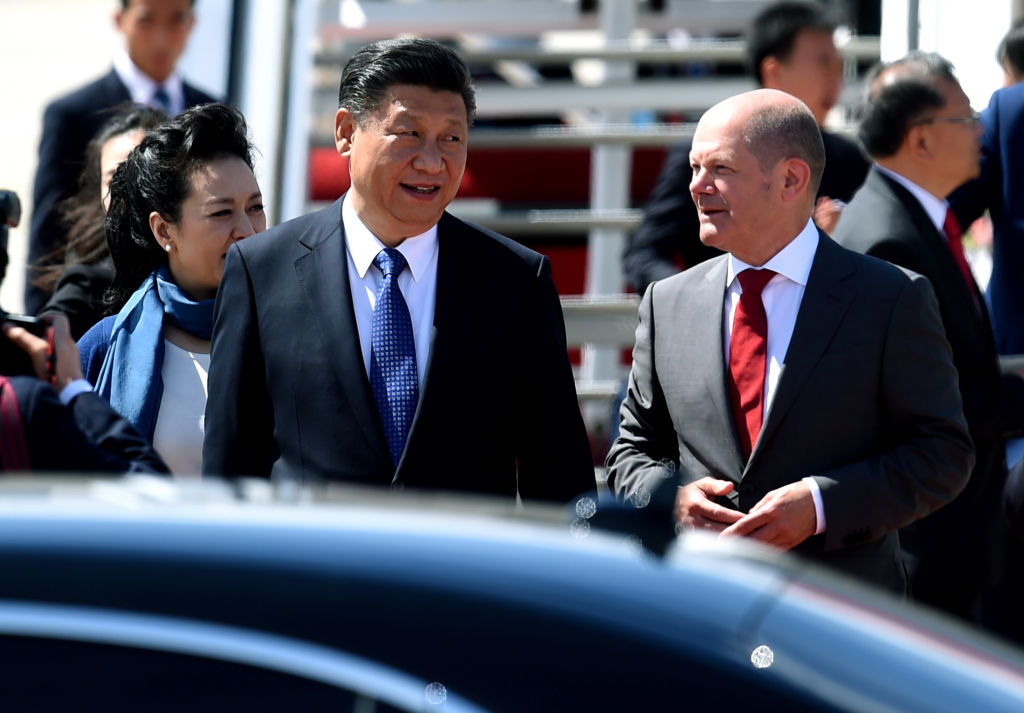This afternoon, German Chancellor Olaf Scholz goes to China. His one-day visit to Beijing is the first by a democratic leader since the outbreak of the Covid pandemic nearly three years ago. But before he has even touched down on Chinese soil, Scholz’s trip is going down badly back home.
‘It’s the wrong visit at the wrong time,’ declared the broadsheet newspaper Die Welt. Scholz will be the first Western leader to meet with President Xi since he secured his unprecedented third term in power. For many China-watchers, Xi’s consolidated rule and zombification of the country’s Communist party marks a watershed moment for the country – not one, according to Die Welt, that Germans think Scholz should be lending any support to.
The make-up of Scholz’s trip, too, has been met with disapproval: a ‘trip with heavy baggage’, said the news site Tagesschau. Accompanying Scholz on the visit to meet Xi will be an entourage of German CEOs from companies including Adidas, Deutsche Bank and Siemens. The visit, the Chancellery has insisted, is primarily about building diplomatic relations and holding frank discussions about global events, including Russia’s invasion of Ukraine, rather than about touting Chinese investment.
Few in Germany are convinced that jumping from heavy dependence on Russia to China is a good idea
But the decision by Scholz to mix business and diplomacy is, nevertheless, viewed as unwise by Germans back home, including his own government. Many think that the time is ripe to put tough questions to China regarding Taiwan and its record of human rights abuses towards Uighur Muslims. They are sceptical that Scholz will be able to grill Xi appropriately with business leaders hoping to scoop favourable deals in tow. This will, in the words of broadsheet newspaper Die Zeit, be a ‘diplomatic test’ for him.
Scholz’s visit comes a week after he pushed through a deal to allow China-owned company Costco to buy over a quarter of shares in the German port of Hamburg, despite it originally being blocked by his own foreign ministry over concerns of Chinese interference. Scholz’s willingness to travel to China and seemingly deepen links between the two countries has reportedly filled some of his MPs with ‘horror’. Carrying an interview with German MEP Rasmus Andresen, current affairs magazine Der Spiegel damningly quotes him saying ‘Olaf Scholz is not living up to what is expected of his leadership role’. Andresen also touches on Scholz’s decision to reject Macron’s proposal for a joint visit to demonstrate European unity: ‘a pity and a missed opportunity’.
Against the background of the war in Ukraine, Scholz’s visit to China has also raised questions concerning the country’s foreign dependencies. Nine months on from Putin’s invasion, Germany is still working through the consequences of deciding to wean itself off Russian gas following years of over-dependence. Few in the country are convinced that jumping from heavy dependence on Russia to China through increased business links is a good idea, not to mention any potential issues of national security that may accompany them.
Der Spiegel suggests Scholz’s stance on China has emerged from his desire to emulate his predecessor Angela Merkel, who was famously cooperative with China and made twelve diplomatic visits to the country in her sixteen-year tenure. The magazine brands any attempt by Scholz to follow in the footsteps of her China policy a ‘fatal flaw’.
In recent days, German criticism of Scholz’s imminent visit has heated up to such a degree that the Chancellor has felt the need to defend himself in person. Publishing an article in the broadsheet Frankfurter Allgemeine Zeitung yesterday, he set out five reasons why he is making the trip. Firstly, China has changed a lot in the past decade, he argued – Xi’s embrace of Marxism-Leninism makes questions of national security even more important.
Combined with other global changes, such as the war in Ukraine, Scholz secondly made the case that Germany’s attitude to China must change too. Thirdly, this involves an evolution in the two countries’ trading relationship: Germany must move away from ‘risky dependencies’ towards diversification. Fourthly, this visit would, he said, also provide an opportunity for Germany to challenge China on Taiwan and the Uighurs, as well as, finally, to promote European and Chinese cooperation on the global stage. As well as travelling to Beijing as Germany’s Chancellor, Scholz said, he would also be travelling ‘as a European’.
Scholz’s visit to China may last less than 24 hours, but Germany will be watching every moment. That the country is unconvinced by his reasoning for making the trip is clear. Whether they think he has passed this diplomatic test of his own making we shall soon find out.







Comments